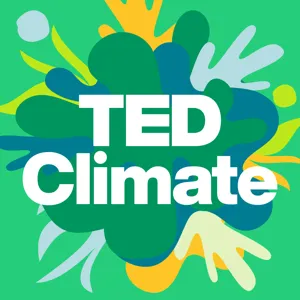Podcast Summary
Urgency of finding solutions to phase out fossil fuels for climate change: World leaders call for action to decrease emissions and align goals, but the focus on fossil fuels for economic gains raises questions about commitment to the 1.5-degree goal.
The 1.5 degrees Celsius limit for preventing catastrophic climate change is a pressing global issue, and the main driver of rising temperatures is the emission of greenhouse gases from burning fossil fuels. World leaders, including UN Secretary-General Antonio Guterres and COP 28 President Sultan Al Jabber, emphasized the urgency of finding solutions and achieving consensus to phase out fossil fuels and prevent a planetary crisis. However, the president of COP 28, who also leads one of the biggest oil companies in the world, raises questions about the alignment of goals when the meeting's focus is on decreasing emissions while major oil-producing countries continue to rely on fossil fuels for significant economic gains. It's a complex issue that requires flexibility, finding common ground, and a clear commitment to the 1.5-degree goal.
Staying Ahead in a Competitive Business Landscape: Leverage technology like cloud and AI for a strategic edge, invest in renewables and lower carbon solutions, make eco-friendly choices, and navigate the future with a human-led, tech-powered approach.
While automation and technology may not directly take your job, the business landscape is increasingly competitive, and staying ahead requires a strategic approach. PwC emphasizes the importance of leveraging technology, such as the cloud and AI, to gain an edge and adapt to changing markets. However, it's essential to do so responsibly. Meanwhile, the urgent issue of climate change demands action, with the window for preventing catastrophic consequences narrowing. The upcoming COP 28 summit, being held in a major oil-producing country, presents a significant challenge in balancing economic interests and environmental sustainability. Enbridge, a major energy company, is investing in renewables and lower carbon solutions to bridge the gap between today's energy needs and the sustainable future. As individuals, we can also contribute by making eco-friendly choices, such as using credit cards that offer rewards for sustainable travel. Ultimately, it's a complex equation that requires a human-led, tech-powered approach to navigate the future.
Gulf countries facing harsh realities of climate change while grappling with oil reliance: Gulf nations acknowledge climate change urgency but face economic, political challenges in transitioning to renewable energy
The Gulf countries, including the UAE and Saudi Arabia, are facing the harsh realities of climate change with rising temperatures and extreme weather, while also grappling with the economic and political implications of their reliance on oil and gas exports. These nations are making efforts to diversify their economies and invest in renewable energy and technology to reduce their carbon footprint and future-proof their economies, but the transition may not be easy or quick. They are also exploring alternative technologies like carbon capture, which are not yet proven to be effective or affordable. The Gulf countries are thus caught in a dilemma, as they acknowledge the urgency of addressing climate change while also recognizing the significant economic and political consequences of reducing their oil and gas production.
Balancing Energy Security and Economic Interests with Climate Action: Countries prioritizing oil and gas production, like the UAE and Saudi Arabia, face the challenge of balancing energy security, economic interests, and climate action. The transition to renewable energy and net zero emissions remains a complex issue.
Despite the global push towards net zero emissions, countries like the UAE and Saudi Arabia, led by influential figures like Sultan Al Jabber who heads both a major oil company and the COP 28 presidency, continue to prioritize oil and gas production to meet global demand. While Al Jabber acknowledges the inevitability of a phase down of fossil fuels, he has not provided a clear timeline for this transition. This dynamic highlights the ongoing challenge of balancing energy security and economic interests with the urgent need to reduce greenhouse gas emissions.
UAE balances oil profits and renewable energy at UN climate summit: The UAE, an oil-rich nation and UN climate summit host, is investing in renewable energy while maintaining oil profits and influencing climate talks to delay phasing out fossil fuels.
The UAE, as a major oil producer and host of this year's UN climate summit, is working to secure a voice in the transition to renewable energy while continuing to profit from oil and gas. The UAE has pledged significant funds towards renewable technology and adaptation for developing countries, but also aims to influence the language around phasing out fossil fuels in the talks. The urgency to reduce carbon emissions and transition away from oil and gas to meet the 1.5-degree threshold is clear, but the world's economies, including those of oil-producing nations, continue to rely on these resources for revenue. The UN experts have emphasized the need to cut carbon emissions by nearly half by 2030, making it clear that burning more oil and gas is not a viable solution for reaching this goal. The complexity of this issue is further highlighted by the fact that these UN talks adopt positions based on consensus, allowing countries like China to also influence the discussions.
Stay informed about political developments in D.C. with the Washington Wise podcast: Listen to the Washington Wise podcast from Charles Schwab for insights on how political news may impact your portfolio, and consider switching to Mint Mobile for affordable wireless plans starting at $15 a month.
Staying informed about the latest news and trends in Washington, D.C. is crucial for investors looking to protect and grow their finances. With the Washington Wise podcast from Charles Schwab, listeners can gain valuable insights into how political developments may impact their portfolios. Meanwhile, as inflation continues to rise, Mint Mobile is offering a solution for those looking to save money on their wireless plans, with premium service starting at just $15 a month. For those interested in making the switch, they can visit mintmobile.com/switch.







 Liz Burdock, Executive Director of the
Liz Burdock, Executive Director of the